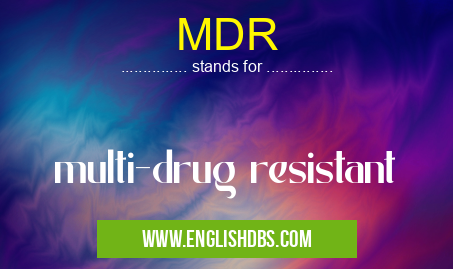What does MDR mean in PHYSIOLOGY
MDR, or multi-drug resistant, is a term used to describe bacteria that have developed resistance to two or more antibiotics. Antibiotic resistance occurs when bacteria change in a way that lets them survive exposure to an antibiotic that would otherwise kill them or inhibit their growth. MDR poses a significant public health threat as it can lead to longer-lasting and more severe infections and complicate the treatment of patients.

MDR meaning in Physiology in Medical
MDR mostly used in an acronym Physiology in Category Medical that means multi-drug resistant
Shorthand: MDR,
Full Form: multi-drug resistant
For more information of "multi-drug resistant", see the section below.
» Medical » Physiology
Essential Questions and Answers on multi-drug resistant in "MEDICAL»PHYSIOLOGY"
What organisms are considered multi-drug resistant?
Multi-drug resistant refers to any organism such as bacteria, fungi, parasites, viruses, etc., that has become resistant to two or more antibiotics.
How does an organism become multi-drug resistant?
An organism becomes multi-drug resistant when it develops specific genetic mutations which allow it to survive the exposure of antibiotics that would normally be effective against it. These mutations enable the organism to protect itself by either breaking down the antibiotic before it has time to start working or by preventing the antibiotic from getting into its cells in the first place.
What kind of illnesses can be caused by MDR organisms?
Multi-drug resistant organisms can cause a range of illnesses including urinary tract infections, sepsis, pneumonia, and some sexually transmitted diseases such as gonorrhoea and chlamydia.
How does MDR affect patient care?
MDR poses a significant public health threat as it can make infections harder to treat and complicate patient care plans. For instance, an infection caused by a MDR organism may require alternative therapies that are more expensive or have higher risks associated with them than conventional treatments. Additionally, treatment with certain antibiotics may be less successful due to their decreased effectiveness against MDR organisms.
How can we reduce the impact of MDR?
The best way to reduce the impact of MDR is through preventative measures such as proper sanitation practices, vaccinations for preventable diseases, following hand hygiene procedures, avoiding overuse and misuse of antibiotics in humans and animals, improving access to clean water sources and proper waste management systems.
Final Words:
In summary, multi-drug resistant (MDR) describes any organism with acquired resistance to two or more antibiotics due its genetic mutations which prevent its death from exposure from those antibiotics. It poses a significant public health risk due its ability to cause more severe and complicated illnesses while also making treatments less effective. To reduce this risk we must take proactive steps such as proper sanitation practices, improved access to clean water sources etc., in order keep ourselves safe from these dangerous pathogens.
MDR also stands for: |
|
| All stands for MDR |
